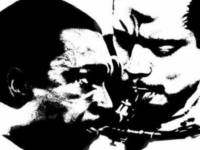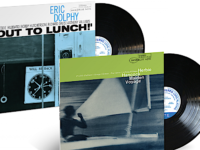“Thank you very much, you make me feel so wonderful. It’s been a pleasure being here but I really must go now, it’s so hot.” — Clifford Brown at the end of his final performance, June 25, 1956
Jazz history is full of personal tragedies; so many of the greats who for various reasons, left us far too soon. For some of these legends, the last music they made adds a poignancy to their deaths. It’s something that allows fans to take solace in knowing they left us at the top of their game, but also left us wondering where their music might have gone had they lived longer.
I’m always loathe to declare absolutes in the “best” of anything, because I could end up disagreeing with myself later on and have probably forgotten about some other great records. But I’ll offer up five selections that I regard as some of the finest codas in the jazz canon …
ERIC DOLPHY – OUT TO LUNCH (1964): We begin with one of the more famous exits; this avant-garde jazz masterpiece is rightfully considered Dolphy’s crowning achievement. He started his career as a leader a mere four years earlier and was already stretching the boundaries of the bop conventions then. Every record since represented a discrete progression until he reached perfection with this record.
Why is it so great? I think it has to do with his tenure at the time with Charles Mingus; Mingus was a master of looking ahead with his music while staying deeply rooted in jazz tradition. Thelonius Monk was good at that, too. Dolphy tried for years but finally got it down with this record. And he found a willing young group of co-conspirators: 17-year-old Tony Williams, then-unknown Bobby Hutcherson, Richard Davis and an in-his-prime Freddie Hubbard. These guys seemed to take turns holding down the fort while the rest played completely free. It was already well established that Dolphy could play a morbidly badass bass clarinet but here, even his flute sends chills down spines.
The music sounded like acid-induced soundtracks for episodes of The Twilight Zone. And in 1964, everyone who heard this must have been trippin’ out over it. Without the aid of drugs.
JOHN COLTRANE – INTERSTELLAR SPACE (1967): Slowly dying of liver cancer and already in some considerable pain by February of 1967, John Coltrane records a saxophone performance that would insure he’d go to his grave five months later with no one ever surpassing him, much less match him on the instrument. With only jingly bells and the equally fiery drums of Rashied Ali to accompany him, JC’s next-to-final statement in the studio (the sessions for the full combo’s Stellar Regions and Expression immediately followed) is an admittedly difficult listen — and I didn’t like it at all the first time I heard it. But put in the context of the direction he was taking his music since My Favorite Things, this project was where he was headed all along.
There was always a certain spirituality in his music from the time of My Favorite Things, and gradually all elements of bop structure were peeled away from his music, layer by layer, until that spirituality was the only thing left standing. Interstellar Space is where the Trane arrived at the station.
ART PEPPER – GOIN’ HOME (1982): While Coltrane came to terms with his impending death by an outpouring of tumultuous, violent expression, Art Pepper prepared to meet his maker in a more quiet, introspective setting. But like Trane, he was joined by only one other player: the sublime and vastly underrated pianist George Cables.
Using a collection of almost all standards, Pepper alternates between alto sax and clarinet to provide the living a sweetly low key set that finds the leader still in top form with his usual strong sense of melody. But his 56 year old body had been battered from years of hard living, despite having cleaned up and enjoying a remarkable renaissance. Sadly, one month later he was dead from a cerebral hemorrhage.
BILL EVANS – CONSECRATION (1980): This record documents a live engagement at San Francisco’s Keystone Korner just a couple of weeks before years of drug abuse caught up with Evans. Backed the sympathetic pair of Joe La Barbera on drums and Marc Johnson on bass, Evans played with a real passion that belied the bad shape he was said to be in at the time. Check out his lightning fast runs on “Someday My Prince Will Come.” That’s right, I said lightning fast runs in reference to Bill Evans.
Bill was introspective and cerebral but he was never a wuss. He made damned sure no one would accuse him of leaving us that way, either.
CLIFFORD BROWN – THE BEGINNING OF THE END (1956): Of all the tragedies I listed, this is perhaps the saddest. Clifford Brown’s trumpet technique was already flawless and on par with Dizzy Gillespie, Fats Navarro and Miles Davis at age 25. Some would say it was already better than those cats by then. And in a profession riddled with drugs and booze, Clifford was the model for clean living.
A mere four years into his recording history, Brown seemed destined for a long, highlight-filled career and poised to become the greatest jazz trumpet player of all time except for perhaps Louis Armstrong. But fate had other plans.
On the night of June 25, 1956, Brown played for his hometown crowd in Philadelphia before embarking on an overnight car trip to Chicago with his pianist friend Richie Powell and Powell’s wife. The gig was recorded, and surprisingly well. Clifford played phenomenally, hitting every note right on and clearly so. He wrapped up the set with the simple remarks at the beginning of this article and then set out for Chicago with the Powells. But they never made it out of the state of Pennsylvania. Nancy Powell lost control of the car she was driving and crashed it. All three occupants perished.
Listen to the promise contained in the last song Clifford ever played just hours before that promise was snuffed out on the Pennsylvania Turnpike.
- Christian Marien Quartett – ‘How Long Is Now’ (2024) - April 18, 2024
- Dave Douglas, feat. James Brandon Lewis – ‘Gifts’ (2024) - April 11, 2024
- Thollem – ‘Worlds In A Life, Two’ (2024) - April 8, 2024




